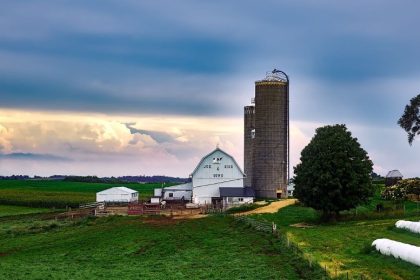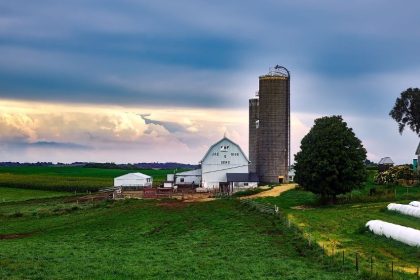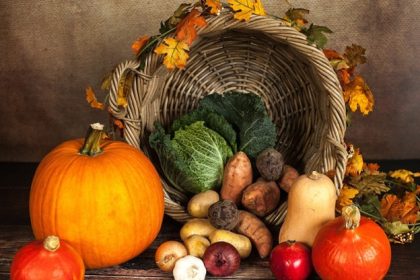More Consumers Buying Organic, but US Farmers Still Wary

CHURDAN, Iowa (AP) — In the 1970s when George Naylor said he wanted to grow organic crops, the idea didn’t go over well.
Back then organic crops were an oddity, destined for health food stores or maybe a few farmers markets.
“I told my dad I wanted to be an organic farmer and he goes, ‘Ha, ha, ha,’” Naylor said, noting it wasn’t until 2014 that he could embrace his dream and begin transitioning from standard to organic crops.
But over the decades, something unexpected happened — demand for organics started increasing so fast that it began outstripping the supply produced in the U.S.
Now a new challenge has emerged: It’s not getting consumers to pay the higher prices, it’s convincing enough farmers to get past their organic reluctance and start taking advantage of the revenue pouring in.
Instead of growing to meet the demand, the number of farmers converting to organic is actually dropping. Last month, the U.S. Department of Agriculture committed up to $300 million to recruit and help more farmers make the switch.
“It feels good,” said Chris Schreiner, executive director of the organic-certifying organization Oregon Tilth, referring to the government help. “It’s a milestone in the arc of this work.”
Schreiner, who has worked at the Oregon-based organization since 1998, said expanding technical training is important given the vast differences in farming land conventionally and organically. Schreiner noted that one farmer told him that converting a conventional farmer was like asking “a foot doctor to become a heart surgeon.”
The key difference is the use of synthetic fertilizers and pesticides as well as genetically modified seeds. Most conventional farms rely on those practices but they are banned at organic farms. Instead, organic farmers must control weeds and pests with techniques such as rotating different crops and planting cover crops that squeeze out weeds and add nutrients to the soil.
Crops can only be deemed organic if they are grown on land that hasn’t been treated with synthetic substances for three years. During that period, farmers can grow crops, but they won’t get the extra premium that accompanies organic crops.
According to the USDA, the number of conventional farms newly transitioning to organic production dropped by about 70% from 2008 to 2019. Organic comprises about 6% of overall food sales, but only 1% of the country’s farmland is in organic production, with foreign producers making up the gap.
In the U.S, “There are so many barriers to farmers making that leap to organic,” said Megan DeBates, vice president of government affairs for the Organic Trade Association.
While farmers seem hesitant, U.S. consumers aren’t. Annual sales of organic products have roughly doubled in the past decade and now top $63 billion, according to the Organic Trade Association. Sales are projected to climb up to 5.5% this year.
That growth is clear to anyone pushing a cart in an average supermarket, past bins of organic apples and bananas, through dairy and egg sections and along shelves brimming with organic beef and chicken.
The new USDA effort would include $100 million toward helping farmers learn new techniques for growing organic crops; $75 million for farmers who meet new conservation practice standards; $25 million to expand crop insurance options and reduce costs; and $100 million to aid organic supply chains and develop markets for organics.
Nick Andrews, an Oregon State University extension agent who works with organic farmers, called the USDA effort a “game changer.” It should be especially attractive to farmers with small parcels of land because the added value of organic crops makes it possible to make significant money off even 25 to 100 acre (10 to 40 hectare) farms — much smaller than the commercial operations that provide most of the country’s produce.
“I’ve seen organic farmers keep families in business who otherwise would go out of business,” Andrews said.
Noah Wendt, who in the past few years has transitioned 1,500 acres (607 hectares) of land in central Iowa to organic, noted the shift has been “rocky” at times for him and his farming partner, Caleb Akin.
But he and Akin recently bought a grain elevator east of Des Moines to use solely for organic crops, the kind of project the USDA program can assist. They hope the elevator will not only be a nearby spot to store grain but provide a one-stop shop to learn about growing and marketing organic crops.
Seeing all the organic activity is gratifying for George and Patti Naylor, who farm near the tiny central Iowa community of Churdan. But they say they still value most the simple benefits of their choice, such as evenings spent watching hundreds of rare monarch butterflies that flock to their herbicide-free farm.
As Patti Naylor put it, “It really helps to believe in what you’re doing.”























